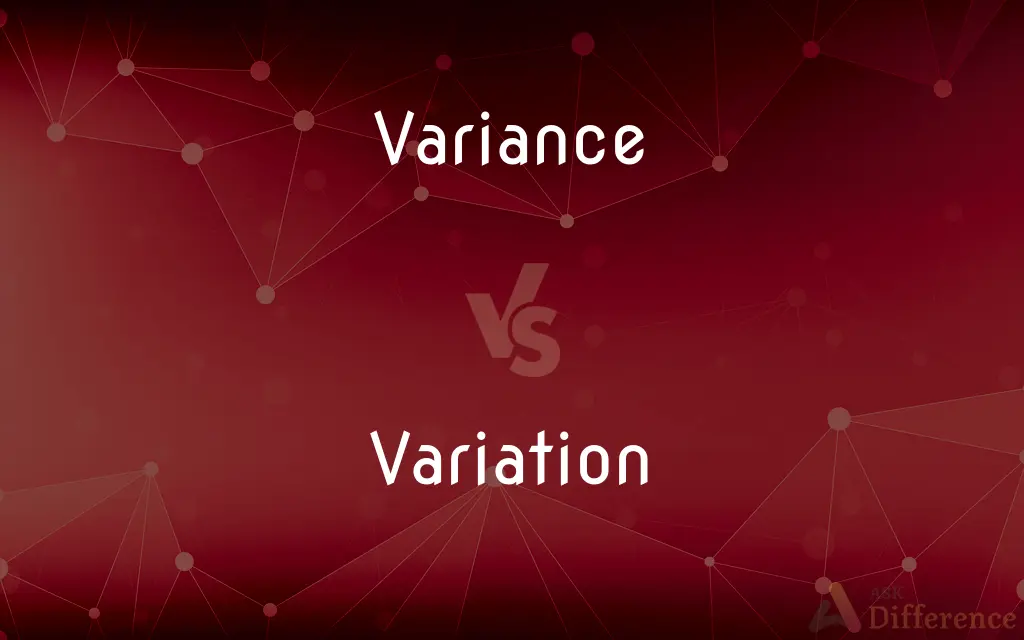Variance vs. Variation — What's the Difference?
By Tayyaba Rehman — Updated on November 2, 2023
Variance is a statistical measure of dispersion, whereas variation refers to the range of differences in a set of variables.

Difference Between Variance and Variation
Table of Contents
ADVERTISEMENT
Key Differences
Variance is a statistical term quantifying how far a set of numbers are spread out from their average value. Variation, on the other hand, encompasses the concept of diversity and change within a set or between entities.
When calculating variance, one squares the differences between each number and the mean, while variation simply observes and often qualitatively describes the differences without squaring and averaging them.
Variance is a more formal and calculated measure, often used in statistical analysis to predict outcomes and assess reliability. Variation is a broader term that can describe any difference in data, physical traits, conditions, etc., without requiring a mathematical formula.
In science, variance is critical in experiments to determine if results are significant, whereas observing variation can lead to hypotheses about causes of differences in natural phenomena.
Comparison Chart
Definition
Measure of how numbers in a set differ from the mean of the set.
The range or diversity of different forms, types, or instances.
ADVERTISEMENT
Discipline
Primarily used in statistics and probability.
Used in various fields, including biology, sociology, and linguistics.
Calculation
Calculated as the average of squared deviations from the mean.
Not necessarily calculated; often observed and noted.
Use in Analysis
Indicates reliability and variability within a data set.
Indicates the extent of diversity or the scope of changes.
Complexity
A precise, mathematical concept.
Can be a simple, qualitative assessment.
Compare with Definitions
Variance
An indication of how much individuals in a group differ from the group average.
The team's variance in sales numbers reflected their diverse selling strategies.
Variation
The act, fact, or process of varying.
Variance
An official dispensation from a rule or regulation, typically a building regulation.
Variation
The extent or degree to which something varies
A variation of ten pounds in weight.
Variance
The state or fact of being in disagreement or in conflict
I am at variance with her over who should pay for the damage.
Variation
Magnetic declination.
Variance
The expectation of the squared deviation of a random variable from its mean.
High variance in investment returns can signal greater financial risk.
Variation
A change or difference in condition, amount, or level.
Seasonal variation affects crop yields.
Variance
A permission to deviate from the standard conditions or rules.
They applied for a variance to exceed the building height restrictions.
Variation
An alteration in the pitch or tone of a person's voice.
His speech was monotonous, lacking any variation in tone.
Variance
In probability theory and statistics, variance is the expectation of the squared deviation of a random variable from its mean. Variance is a measure of dispersion, meaning it is a measure of how far a set of numbers is spread out from their average value.
Variation
A change or slight difference in condition, amount, or level, typically within certain limits
Regional variations in house prices
The figures showed marked variation from year to year
Variance
The fact or quality of being different, divergent, or inconsistent
Her light tone was at variance with her sudden trembling
The stylistic variances of classical dance
Variation
A different or distinct form or version of something
Hurling is an Irish variation of hockey
Variance
The state or quality of being variant or variable; variation
Considerable variance in temperature across the region.
Variation
Something different from another of the same type
Told a variation of an old joke.
Variance
Difference or inconsistency
Your behavior is at variance with your beliefs.
Variation
(Biology) The existence within a species or other group of organisms of differences in form, function, or behavior, especially when hereditary.
Variance
A discrepancy between two statements or documents, especially between the charge in a criminal indictment and the evidence presented.
Variation
(Mathematics) A function that relates the values of one variable to those of other variables.
Variance
An exception to the application of a usual rule, granted by an authority on the basis of hardship or practicality
A zoning variance.
Variation
A form that is an altered version of a given theme, diverging from it by melodic ornamentation and by changes in harmony, rhythm, or key.
Variance
(Statistics) The square of the standard deviation.
Variation
One of a series of forms based on a single theme.
Variance
(Chemistry) The number of thermodynamic variables, such as temperature and pressure, required to specify a state of equilibrium of a system, given by the phase rule; the degrees of freedom of a system.
Variation
A solo dance, especially one forming part of a larger work.
Variance
The act of varying or the state of being variable.
Variation
The act of varying; a partial change in the form, position, state, or qualities of a thing.
Variance
A difference between what is expected and what is observed; deviation.
Variation
A related but distinct thing.
When the process didn't work, we tried a variation.
All of his soups are variations on a single recipe.
Variance
The state of differing or being in conflict.
Variation
(nautical) The angular difference at the vessel between the direction of true north and magnetic north.
Magnetic declination
Variance
An official permit to do something that is ordinarily forbidden by regulations.
Variation
(board games) A line of play that differs from the original.
Variance
(law) A discrepancy between two legal documents.
Variation
(music) A technique where material is repeated with alterations to the melody, harmony, rhythm, timbre, texture, counterpoint or orchestration; but with some invariant characteristic, e.g. a ground bass.
Variance
(law) A departure from a cause of action originally in a complaint.
Variation
(genetics) The modification of a hereditary trait.
Variance
(statistics) The second central moment in probability.
Variation
(astronomy) Deviation from the mean orbit of a heavenly body.
Variance
The number of degrees of freedom in a system.
Variation
The act of varying; a partial change in the form, position, state, or qualities of a thing; modification; alteration; mutation; diversity; deviation; as, a variation of color in different lights; a variation in size; variation of language.
The essences of things are conceived not capable of any such variation.
Variance
Covariance and contravariance generally.
Depending on the variance of the type constructor, the subtyping relation of the simple types may be either preserved, reversed, or ignored for the respective complex types.
Variation
Extent to which a thing varies; amount of departure from a position or state; amount or rate of change.
Variance
The quality or state of being variant; change of condition; variation.
Variation
Change of termination of words, as in declension, conjugation, derivation, etc.
Variance
Difference that produces dispute or controversy; disagreement; dissension; discord; dispute; quarrel.
That which is the strength of their amity shall prove the immediate author of their variance.
Variation
Repetition of a theme or melody with fanciful embellishments or modifications, in time, tune, or harmony, or sometimes change of key; the presentation of a musical thought in new and varied aspects, yet so that the essential features of the original shall still preserve their identity.
Variance
A disagreement or difference between two parts of the same legal proceeding, which, to be effectual, ought to agree, - as between the writ and the declaration, or between the allegation and the proof.
Variation
One of the different arrangements which can be made of any number of quantities taking a certain number of them together.
Variance
The expected value of the square of the deviation from the mean of a randomly distributed variable; the second moment about the mean. This is also the square of the standard deviation.
Variation
An instance of change; the rate or magnitude of change
Variance
An event that departs from expectations
Variation
An activity that varies from a norm or standard;
Any variation in his routine was immediately reported
Variance
Discord that splits a group
Variation
A repetition of a musical theme in which it is modified or embellished
Variance
The second moment around the mean; the expected value of the square of the deviations of a random variable from its mean value
Variation
Something a little different from others of the same type;
An experimental version of the night fighter
An emery wheel is a modern variant of the grindstone
The boy is a younger edition of his father
Variance
A difference between conflicting facts or claims or opinions;
A growing divergence of opinion
Variation
An artifact that deviates from a norm or standard;
He patented a variation on the sandal
Variance
The quality of being subject to variation
Variation
The angle (at a particular location) between magnetic north and true north
Variance
An activity that varies from a norm or standard;
Any variation in his routine was immediately reported
Variation
(astronomy) any perturbation of the mean motion or orbit of a planet or satellite (especially a perturbation of the earth's moon)
Variance
A statistical measure of the spread between numbers in a data set.
The variance in the test scores indicates a wide disparity in student performance.
Variation
(biology) an organism that has characteristics resulting from chromosomal alteration
Variance
In probability theory, the square of the standard deviation.
The variance from the set of data helped us understand the distribution's consistency.
Variation
(ballet) a solo dance or dance figure
Variation
The act of changing or altering something slightly but noticeably from the norm or standard;
Who is responsible for these variations in taxation?
Variation
The occurrence of an organism or object in different forms.
The color variation in the butterflies was a result of genetic diversity.
Variation
A different version or form of something.
She played a variation of the original song on her guitar.
Variation
A deviation from the norm or standard.
The variation in temperature this winter has been unusual.
Common Curiosities
Can variation be found in non-numerical data?
Yes, variation can refer to differences in forms, types, or instances, even in non-numerical data.
Is variance always a positive number?
Yes, since it involves squaring differences, variance is always non-negative.
Is variation always observable?
Variation can be observable or measured, depending on the context.
What indicates a high variation in data?
High variation means there's a wide range of values or types within the data set.
What does variance measure?
Variance measures how much the numbers in a dataset differ from their mean.
Can variance be zero?
Yes, if all numbers in a set are the same, the variance is zero.
How do statisticians use variance?
Statisticians use variance to determine the dispersion in a dataset for analyses.
What is an example of variation in biology?
Genetic variation in a population leads to different traits among individuals.
How is variance used in investing?
Variance helps investors understand the volatility of investment returns.
Are variance and standard deviation the same?
No, standard deviation is the square root of the variance.
Can two sets have the same variance but different variations?
Yes, two sets can have the same variance but exhibit different variations in forms or instances.
Does variation always imply a change over time?
Variation can refer to differences at a single point in time as well as changes over time.
Can cultural practices exhibit variation?
Yes, there can be variation in cultural practices among different societies or over time.
Does a variance require calculation?
Yes, calculating variance involves a specific mathematical process.
Is high variance desirable in research data?
Not necessarily; it depends on the context and goals of the research.
Share Your Discovery

Previous Comparison
Surveil vs. Survey
Next Comparison
Pyrite vs. ChalcopyriteAuthor Spotlight
Written by
Tayyaba RehmanTayyaba Rehman is a distinguished writer, currently serving as a primary contributor to askdifference.com. As a researcher in semantics and etymology, Tayyaba's passion for the complexity of languages and their distinctions has found a perfect home on the platform. Tayyaba delves into the intricacies of language, distinguishing between commonly confused words and phrases, thereby providing clarity for readers worldwide.
















































